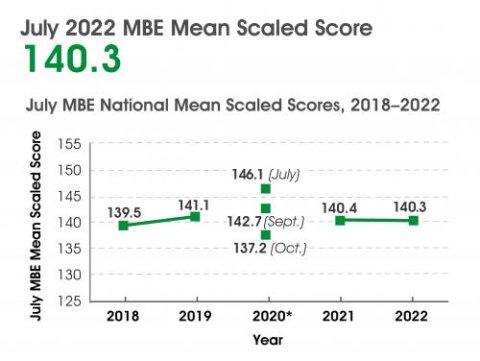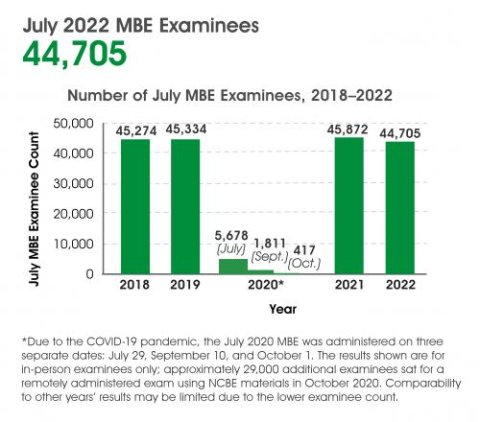National Mean of 140.3 for July 2022 MBE
Average Scores on Multistate Bar Exam Remain Consistent with Previous Years
MADISON, WISCONSIN, September 13, 2022—The national Multistate Bar Examination (MBE) mean scaled score for July 2022 was 140.3, consistent with results from recent years’ July administrations. The July 2022 mean was 0.1 point lower than the July 2021 mean of 140.4 and 0.8 point lower than the July 2019 mean of 141.1. (Comparability with 2020 results is of limited value due to the small number of examinees who took a full MBE in July, September, or October 2020.)
NCBE Director of Assessment and Research Rosemary Reshetar, EdD, commented: “The national mean for this July’s MBE administration was very close to last year’s mean, which suggests that pass rates overall may also look close to what we saw last year. However, it’s important to remember that score distributions and pass rates will often vary across jurisdictions even when there is national score stability. Some jurisdictions will likely see higher pass rates than last year, while others may see fewer candidates pass, depending on factors specific to that jurisdiction, including local passing score, candidate performance, and performance distribution relative to that passing score.”
44,705 examinees took the July 2022 MBE, a decrease of about 2.5% compared to the 45,872 examinees who sat for the exam in July 2021. Approximately 77% of July 2022 examinees were likely taking the exam for the first time, and approximately 23% were likely repeat test takers. [1]
Reliability for the July 2022 exam was 0.94, consistent with the reliability for July 2021 of 0.94 and slightly higher than the 5-year average for previous July administrations. Reliability—the statistical measurement of exam consistency—is expressed on a scale of 0.0 (no reliability) to 1.0 (very high reliability) and is calculated following every administration of the MBE. A high level of consistency is essential to administration of the MBE to ensure that examinees have a fair and equal opportunity to meaningfully demonstrate their legal knowledge on the exam.
Reliability is a prerequisite for exam validity, defined as the extent to which a test measures what it claims to measure: in the case of the bar exam, the knowledge and skills required to perform activities typically required of an entry-level lawyer. Content validity for licensure examinations, like the bar exam, is established through a practice analysis. NCBE performs periodic practice analyses in support of the bar exam in general and the MBE in particular. The last such analysis was performed in 2019.
Jurisdictions have begun reporting their July 2022 results; bar examination pass rates as reported by jurisdictions are available on the NCBE website. Many jurisdictions are still in the process of grading the written components of the bar exam. Once this process is completed, bar exam scores will be calculated and passing decisions reported by those jurisdictions.
About the National Conference of Bar Examiners
The National Conference of Bar Examiners (NCBE), headquartered in Madison, Wisconsin, is a not-for-profit corporation founded in 1931. NCBE promotes fairness, integrity, and best practices in bar admissions for the benefit and protection of the public, in pursuit of its vision of a competent, ethical, and diverse legal profession. Best known for developing bar exam content used by 54 US jurisdictions, NCBE serves admission authorities, courts, the legal education community, and candidates by providing high-quality assessment products, services, and research; character investigations; and informational and educational resources and programs. In 2026, NCBE will launch the next generation of the bar examination, ensuring that the exam continues to test the knowledge, skills, and abilities required for competent entry-level legal practice in a changing profession. For more information, visit the NCBE website at https://www.ncbex.org.
About the Multistate Bar Examination
The MBE is a six-hour, 200-question multiple-choice examination developed by NCBE. Fifty-four US jurisdictions include the MBE as part of their bar examinations. The purpose of the MBE is to assess the extent to which an examinee can apply fundamental legal principles and legal reasoning to analyze given fact patterns. NCBE scores the MBE and reports examinees’ scaled scores to the jurisdiction in which they tested. MBE scaled scores are calculated by NCBE using a statistical process known as equating that is common for standardized examinations. This process adjusts raw scores on the current examination to account for differences in difficulty as compared with past examinations. Equating makes it possible to compare scaled scores across test administrations and helps to ensure that no examinee is unfairly penalized or rewarded for taking a more or less difficult form of the test.
[1] The first-time and repeat MBE-based test taker information calculated by NCBE is an approximation based on the NCBE Number and biographic data, which has not been used consistently in all jurisdictions across time. Prior to 2022, approximately 10% of examinees could not be tracked with certainty by NCBE as either first-time or repeat takers due to a lack of sufficient biographic information.

